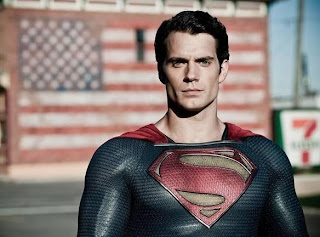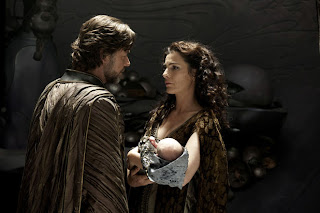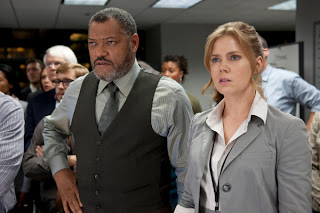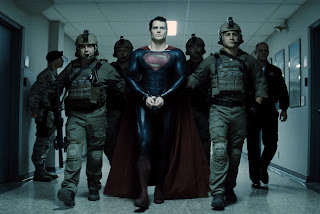I don’t really like
Superman. There. I said it. Now you all know my dark deep secret.
It’s not that I inherently
hate things that are true and good and pure, I just think that there’s a way to
write about things that are true and good and pure without boring the pants off
your audience, and, frankly, Superman has never really managed that for me.
Well, except for in some of the cartoons. But those are always way funnier than
the comics or movies, and I don’t entirely consider them canon.
Anyway. Superman is boring.
He’s got approximately all of the powers, a tragic backstory that he doesn’t
really remember because how would he, he was a baby, and the chiseled jaw of a
supermodel. If he were any more perfect I’d hurl.
So believe me that when I
say that I actually enjoyed Man of Steel,
I am just as surprised as you are. Even more so when I realize that not that
many other people (people like me, cranky critical people) did. And I think I
have some idea why.
But, as always, explanations
first!
In case you’re still under
that magically wifi getting rock, Man of
Steel is the latest Superman movie to come out of Warner Brothers, and a
pretty blatant attempt to wash the taste of Superman
Returns out of our mouths before the Justice League movie gears up in a few
years. It got okay ratings and did quite well in the box office, so I’m pretty
sure it’s considered a success all around.
The story is comic-book
dense, as per usual with DC Comics. Jor-El, Superman’s father, here played by
Russell Crowe in atonement for Les Mis,
is the head scientist on Krypton and knows that his planet is going to die
because blah blah core mining blah blatant fossil fuels analysis blabity blah
blah. He and Lara (Ayelet Zurer) have had a secret baby because Krypton prefers
its babies to be genetically engineered for roles in their society. That baby
is, of course, Superman. Or, as they call him, Kal.
Meanwhile, General Zod
(Michael Shannon, in his best overacting state) has staged a governmental coup
and is chasing down Jor-El because Jor-El stole the codex that does things with
stuff.
Okay, this is where the
movie started to buckle under the weight of its own mythology. About fifteen
minutes in. Before we even got to Earth. Oof.
Long story not even remotely
short, Zod gets captured and Kal gets sent to Earth. Krypton goes boom, and
everyone dies, except for Zod and his gang of nasties, who escaped in their
space prison. They then decided to hunt down Jor-El’s son, who had the codex
with him, because they really really needed the codex. For stuff.
Cut to Earth, where Kal-El
has grown up into the incredibly attractive Henry Cavill, er, Clark Kent, a
drifter with a heart of gold. This is where the movie actually started to get
me involved. Sure, the stuff on Krypton was engaging, if dense, but the moments
we spent with a Clark Kent trying to figure out his place in the world while
not letting said world know he exists? Those were great.
Diane Lane and Kevin Costner
do a solid job as Clark’s parents, though there is a moment of weirdness when
Jonathan Kent seems to be suggesting that Clark should have let a bunch of kids
drown to keep his identity safe.
Eventually Clark meets Lois
Lane, played admirably by the always awesome Amy Adams, and starts her on a
“the truth is out there” hunt for aliens. Which is a nice spin.
Okay, we’re not going to go
blow by blow through the story here. But you get the idea. Super dense
backstory, really intriguing story on Earth, and then what happens?
Zod happens. He gets all
destructive and the second act starts to fall apart, and all of a sudden you’re
sitting in a bombed out shell of Metropolis wondering how the hell the national
economy is supposed to recover from this. Let alone the people.
So why did I think this was
an interesting movie? And more than that, an interesting Superman movie?
Because of the subtext.
Look, I have a lot of
problems with the second half of the film, where Zod gets all terra-forming
happy without any actual reason, but the one thing I really do approve of is
the subtextual debate going on. It happens a little bit on screen, but the bulk
of it has to go on in your head. And that’s okay.
It’s a debate about
eugenics.
You see, on Krypton every baby was designed for a specific role in society even before they were
conceived. The kids were carried to term in weird egg sacks and then farmed out
to be raised in their specific skill sets. Zod himself points this out: “I was
raised to protect Krypton. I have no other purpose.” Or something like that.
Clark/Kal, on the other
hand, wasn’t designed for anything. He was born because his parents had
unprotected sex and then a baby popped out some amount of months later. He’s
all natural, and as such, he has a choice.
The reason Zod wants the
codex, the whole thing driving the plot that it takes several viewings to
understand, is because the codex contains all that genetic information so that
someone can create a fully functioning Kryptonian society from scratch. That’s
what Zod wants to do.
But in so doing, he will be
creating a society just like the last, where he gets to pick and choose which
bloodlines to keep and which to throw out, what is “good” about certain genes,
and what purposes the New Kryptonians should be programmed to have. In short,
Zod wants to be a eugenics god.
And Clark/Kal is against
that. For pretty obvious reasons. Setting aside the moral implications for a
second, if Zod is to succeed, then Kal will immediately become obsolete, like
Ethan Hawke in Gattaca. Or maybe he’ll
still have an advantage over them all because he has his free will. But he’d be
a lonely god, stuck up there with his moral choice while everyone else just
happily goes about their way.
This isn’t even to mention
the whole subtextual angst going on in the movie: Zod himself has no free will.
If we accept that the Kryptonian citizens who were designed solely for a
purpose must serve that purpose no matter what, then Zod has no choice in his
actions. He does what he does because he is absolutely incapable of not doing
that. He must protect Krypton. If Krypton falls he must rebuild Krypton exactly
the same way as it was so that he can protect it. He literally can’t do
anything else.
Which makes it a little
weird to think about that fight scene now.
For all that I’m in favor of
saving the world and not getting turned into a mountain of skulls on which
aliens can repopulate (and I’m very in favor of that not happening), there’s
something inherently tragic in that last fight. Kal, as much as he fights for
moral reasons, is also doing it for personal ones. And Zod, well he’s fighting
because he has to. Because he can’t not fight.
In the end, when Kal kills
Zod, he’s less killing a sentient being than he is putting down a rabid dog.
Or, better analogy, deleting a faulty computer program.
Except here’s the thing. Zod
wasn’t faulty. He did exactly what he was programmed to do. So who do we blame?
Do we blame Zod or do we blame the corrupt society that programmed him this way
in the first place? Oh wait, they’re all already dead.
I like the subtextual moral
debate in Man of Steel not just
because it wrinkles my brain, but also because it adds a lot of much needed
color to the second half. When you realize that these two characters are
fighting because they have absolutely no other choice, and that there is no
point at which they could have avoided this fate, it becomes so epically tragic
and so incredibly engrossing.
It’s a shame the movie didn’t
realize this and then capitalize on it. Or, you know, write a better second
half. But knowing it’s there really does massively improve the film, and I, for
one, am a huge fan of seeing complex moral debates up there on the screen with
the spandex.
Oh, and happy fourth of July and all that stuff. Right.
 |
| Have a picture of one of the more awkward and confusing moments in the film. |






Diane Lane and Kevin Costner do a solid job as Clark’s parents, though there is a moment of weirdness when Jonathan Kent seems to be suggesting that Clark should have let a bunch of kids drown to keep his identity safe.
ReplyDeleteI actually liked this, because Jonathan in essence couldn't bring himself to say *either* that Clark should have saved them and revealed his abilities or let them die and protect himself. Because the right thing for everyone else is conflicting with the right thing for the person for whom he has specific rsponsibility and love. And I think this is what elevates this film above most Superman portrayals - both he and later on Clark want to be good people and do the right thing, but they aren't effortless paragons who never need to put any thought into what the right thing is.
And as you say it's that, just as much as being good, that makes Clark the opposite of Zod.
Valid point, I hadn't really thought about it that way. :)
Delete